Howard Andrew Jones, a Mentee’s Perspective
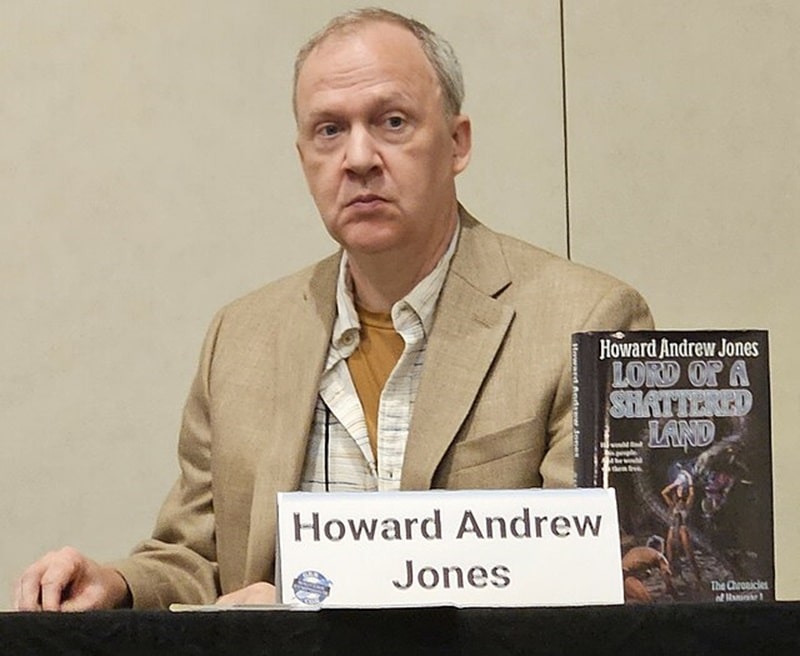
In 2019, I had an idea: a lot of my friends loved reading sword and sorcery fiction, but they didn’t write it. They would say, “One day.” Many of my undergraduates also expressed interest in writing fantasy, but they often felt discouraged by form rejection letters (genre magazine slush piles are epic). Having studied the history of genre fiction, I knew about the old tradition of “fanzines”— not-for-profit amateur publications that provided a low-stakes outlet for new writers. Just submitting work, collaborating with an editor, and seeing it in print can transform someone’s self-image from being just a reader to being a writer.
So, after some conversations with friends and a bit of encouragement, I started thinking seriously about launching my own zine.
As an academic, I’m deliberate by nature. I like to consult and take my time. Honestly, if I could have formed a committee for this, I probably would have. Instead, I decided to email someone: Howard Andrew Jones.
[Click the images for larger versions.]
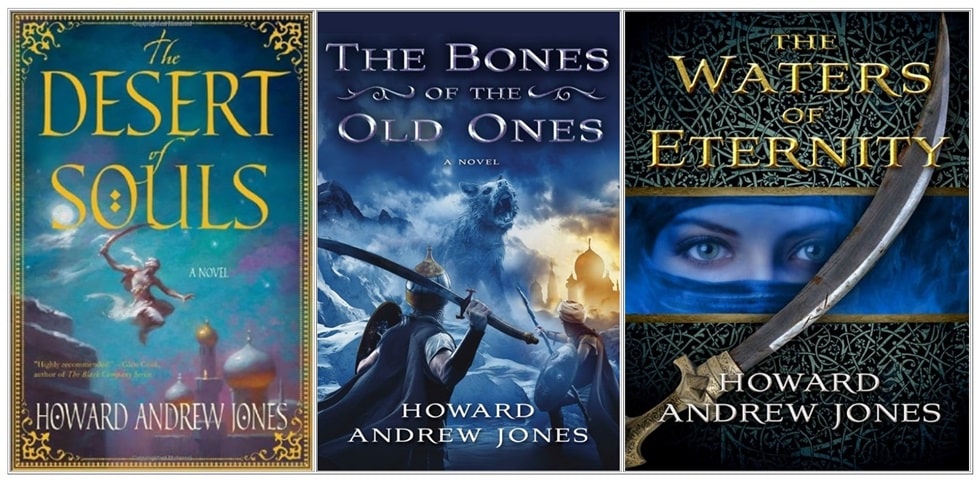
At the time, I didn’t know Howard personally, but I knew of him. He was a celebrated name in sword and sorcery. Howard had published an e-zine (Flashing Swords) in the genre, written essays and edited for Black Gate, and authored an incredible series of novels set in a sword-and-sorcery-inspired Arabia featuring Dabir and Asim (The Desert of Souls and The Bones of the Old Ones). He was also working on a new trilogy, The Ring-Sworn Trilogy, and I had already read the first book.
On top of all that, Howard had written several fun Pathfinder RPG novels, and he was editing Tales from the Magician’s Skull, the magazine for contemporary sword and sorcery fiction, published by Goodman Games. I loved that magazine. If anyone could give me advice on starting a zine, it was Howard.
I didn’t expect much when I emailed him. I wrote a long message, gushed a bit as a fanboy, and sent it off. Honestly, I wasn’t really expecting a response.
The next day, I was in my campus office grading papers when my office phone rang. My office phone never rings. In my ten years at CNU, maybe one student has ever called me. It’s practically an artifact – a dusty relic of a bygone era. My first instinct, as a millennial, was to let it go to voicemail. That’s what you do: let them leave a message and call back after some breathing exercises.
But for some reason, I picked it up.
“Hello?”
“Jason?”
“Yeah, this is Jason.”
The voice on the other end was calm, relaxed, with a kind of deliberate enunciation.
“Heeey, Jason! This is Howard.”
“Howard?” I said, not quite connecting the dots.
“Howard Andrew Jones. You emailed me about a magazine idea.”
I still get a little emotional thinking about that first call. Maybe I’m projecting, but I was immediately surprised, disarmed, and touched. Howard had gone out of his way to call me – call me! My office number isn’t even in my email signature, so he must have looked me up online to find my CNU contact info. I hadn’t even expected a reply, and here was this great author, taking the time to phone me.
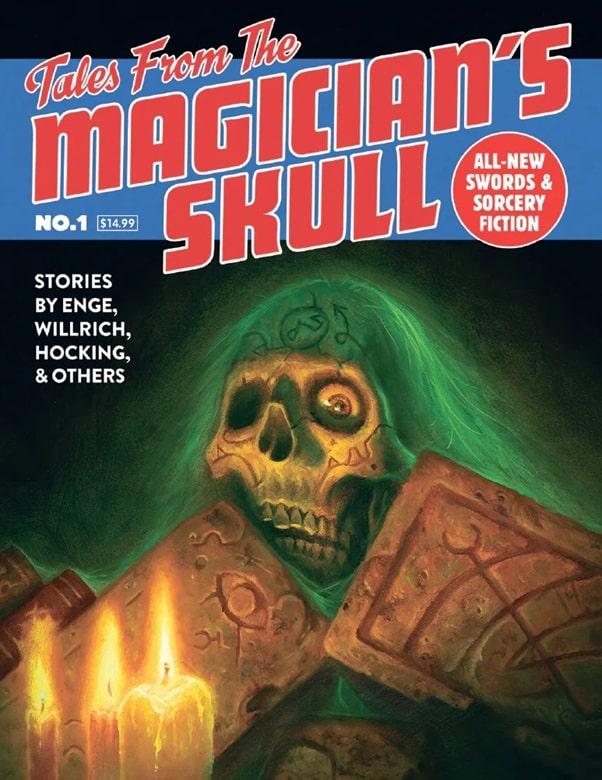 |
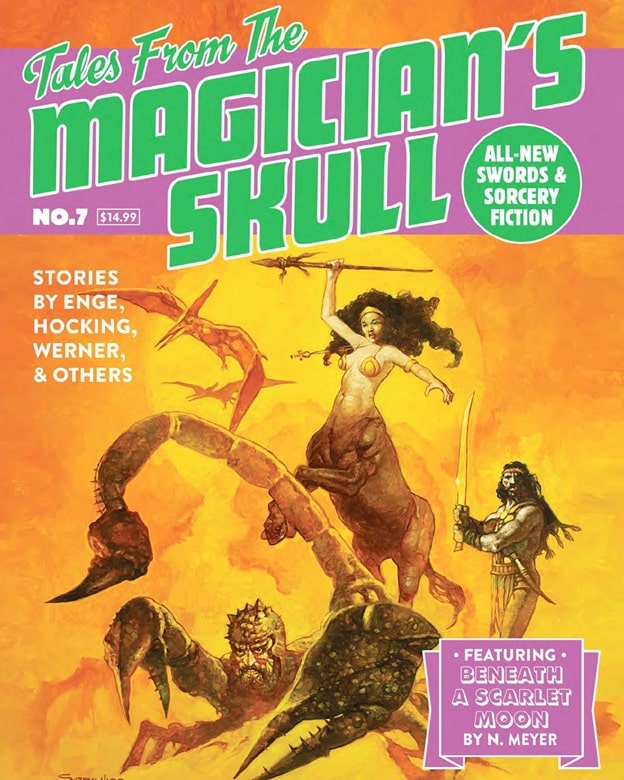 |
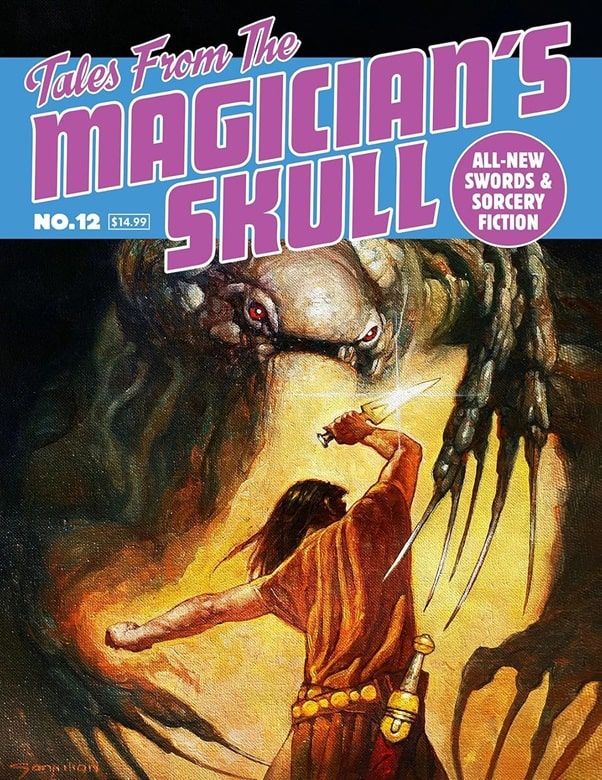 |
Tales of the Magician’s Skull, edited by Howard Andrew Jones. Issues 1, 7, and 12
(Goodman Games, 2017, 2022, and 2024). Cover art by Jim Pavelec and Sanjulian
I was a bit starstruck when we first talked. I’m already an awkward person, but the awkwardness was dialed up as I tried to gather my bearings. Howard, however, was so kind, calm, and genuinely enthusiastic about fiction, writing, and fantasy literature that I found myself speaking to him like an old friend. I’m pretty sure we talked for over an hour during that first conversation. I remember he was multitasking while on the phone – taking out the trash or doing yard work.
In the years that followed, whenever I spoke to Howard, he always seemed to be en route somewhere – driving to town, running errands, sometimes saying, “Hold on, I’ve got to grab this thing.” He felt real and grounded in a way that made people feel at ease. He gave off this sense of being completely unaware of how cool he was or how others saw him – or, if he did know, he just didn’t put much stock in it.
Over the next five years, Howard and I stayed in almost constant contact. We texted regularly. Often, he’d reply to a message with something like, “You free? Driving to town.” When I started my magazine and created an associated Discord server, he joined and became as active there as anyone, if not more so.
His comments were always supportive, kind, and encouraging. He shared favorite authors, thoughts on prose style, and a steady drip of wisdom for aspiring writers. Whenever anyone mentioned his work, he would chime in, “Thanks for reading it,” “Glad it worked for you,” “Really appreciate the kind words.”
Outside of Discord, we talked on the phone often. One thing I noticed was that Howard frequently mentioned his friends – not in a name-dropping way, like he wanted you to know he knew big authors, but in a way that made you feel like you were part of this collaborative effort, this network of fellow creatives. To him, it seemed, writing wasn’t a solitary pursuit but a shared craft. It was like Howard was always attending a seminar on fiction, and his calls were a way of touching base to see how your progress was going.
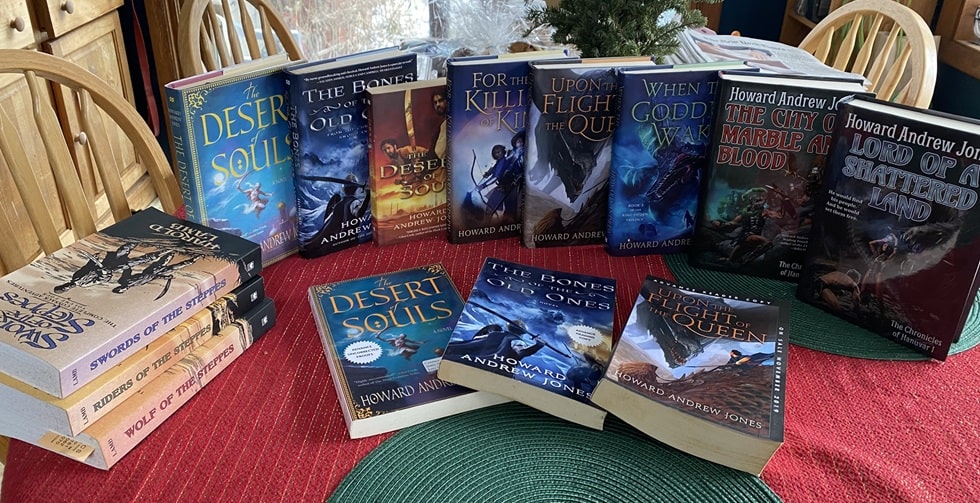
For instance, he’d say something like, “Hocking and I were talking about dialogue – how it needs to reveal character but economically, like in hardboiled detective fiction” (I’m paraphrasing). From the way he spoke, I got the sense that Howard had a lot of writer friends, and they talked about the craft of writing the way master carpenters might talk about solving technical problems with wood.
Fandom can get a little gossipy, but Howard never said a negative thing about anyone. He was almost stubbornly kind and assumed the best intentions from people. Being in touch with him felt like being welcomed into a very supportive club. Over time – without me even realizing it – Howard became something of a mentor or even a sensei in sword and sorcery writing.
At first, we just talked about sword and sorcery (a genre he was deeply opinionated about – he really didn’t like Tros of Samothrace (“Bounced right off it)), but our discussions evolved into broader topics: writing, work, heroism, and how storytelling affects people’s lives. I can honestly say I learned a lot about writing from him, at least an MFA’s worth, or more.
I met Howard in person three times over the six years I knew him. I saw him at GenCon, the big gaming convention that also includes a section for genre writers. We sat on several panels together discussing sword and sorcery fiction. He attended Howard Days, a celebration of Robert E. Howard, the pulp author who created sword and sorcery (yes, it gets confusing). And then I saw him again at GenCon this past August of 2024.
In August, aside from a persistent leg injury, Howard seemed… OK. I need to be honest and say he struck me as a little blue at GenCon, and he suspected it was due to the injury or the associated medication treating it. He had every reason to be happy. He had just published the first two books of his Hanuvar series. If I remember correctly, book three, Shadow of the Smoking Mountain, had just come out or was coming out. At the convention, he gave me an ARC and signed it with the words, “Find a way or make one.” I took this as a nod to the writer’s life, a reminder to persevere and create despite the challenges.
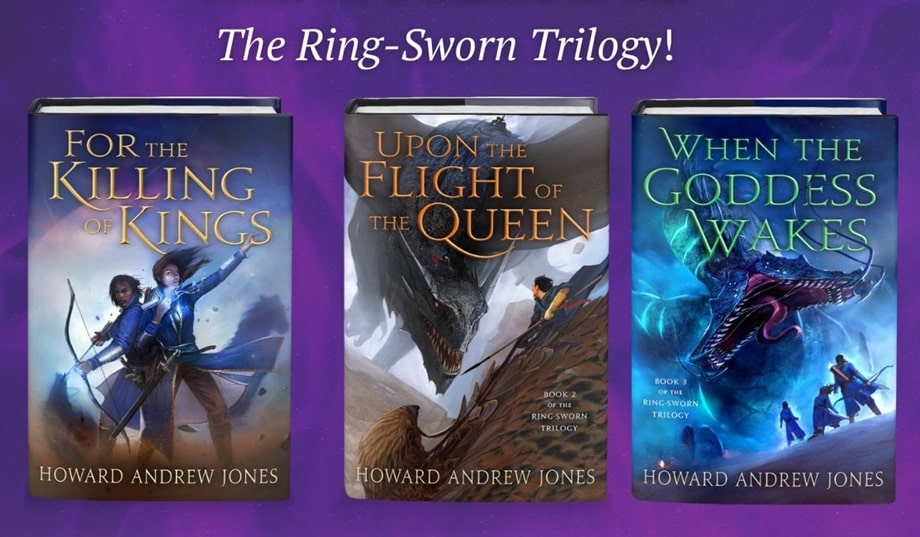
On the last day of GenCon, literally just before leaving, Howard, my wife Nicole, and I had lunch together. It was the first time Howard had met Nicole. She joked and referred to Howard as “my friend in my pocket” because I was always texting with him. I laughed and told her, “You don’t understand – this guy is so cool. He’s the nicest guy you’ll ever meet.”
That might sound like grief-motivated hyperbole now, but, in hindsight, it wasn’t. That’s exactly how I spoke about Howard before I knew anything was wrong.
Nicole and I had lunch with him, and of course, they hit it off. I can’t recall the details but Howard was fascinated with Nicole’s life growing up on a farm (did Howard come from a rural background?). After the meal, Howard said he was glad to have met her.
We left the restaurant. There were hundreds of people in the corridors at GenCon, a veritable sea of humanity, and Nicole and I were ready to leave, luggage in hand. So, we said our goodbyes. I had no idea it was the final goodbye. Howard gave me a hug and said, “Well, safe travels to you and your beautiful wife. And, keep writing.” Then he disappeared into the crowd.
A few weeks later, I learned he had gone to the hospital with acute symptoms.
I’m still in the anger phase of all this. Howard was such a good guy. It felt like, as a writer, he was hitting his peak. In my view, he had so much more to give the world – not just through his novels but through who he was as a person. I know my story is just one of many similar ones. That’s the kind of person Howard was: everyone who met him seemed to come away with a story about his kindness. This tragedy couldn’t have happened to a more undeserving person.
Howard, you’ll be missed, man. Thanks for being you.
Jason Ray Carney is a Lecturer in Popular Literature at Christopher Newport University. He is the author of the academic book, Weird Tales of Modernity (McFarland), and the fantasy anthology, Rakefire and Other Stories (Pulp Hero Press). He edited Savage Scrolls: Thrilling Tales of Sword and Sorcery for Pulp Hero Press and is an editor at The Dark Man: Journal of Robert E. Howard and Pulp Studies and Whetstone: Amateur Magazine of Sword and Sorcery. His last article for Black Gate was a review of Lord of a Shattered Land.
Thanks for those memories. The man made a positive impression wherever he went. Now those of us who knew him get to carry that forward. Lead by example, isn’t that the ticket?
Thank you for reading, sir. Can’t think you enough for all that you.
Captures Howard’s personality and grace perfectly. Sigh. Peace.
Thanks for reading Seth. I honestly felt like my adventures with you and Howard were just beginning.
Damn, Jason. That was awesome!
Thanks, sir. I barely knew Howard compared to you, so your kind words mean a lot.
This rings so true. I first met Howard back in the mid 1990s when he helped me out getting to and from work when my car broke down. I spoke to him last on his way home from 2024 GenCon. Thanks for sharing.
Unbelievably strange to think about how when we’re exchanging last goodbyes, it’s rare that we know we are. 🙁
Your still being in the anger phase is perfectly understandable, Jason. I continue to mention things about Howard to my wife when we are sitting around, having a meal, whatever. I met him just once; our interactions were occasional; but his efforts for our genre and his influence on his generation of writers is wide and deep. He cannot be replaced and we are far the less for it. You have really caught him and the good he did with this remembrance. (I still smile in recalling that he turned down two of my stories on different occasions. He was right; they didn’t fit his editorial policy. Of course, being Howard, he was gracious and polite about it, and it led to a couple of nice chats.)